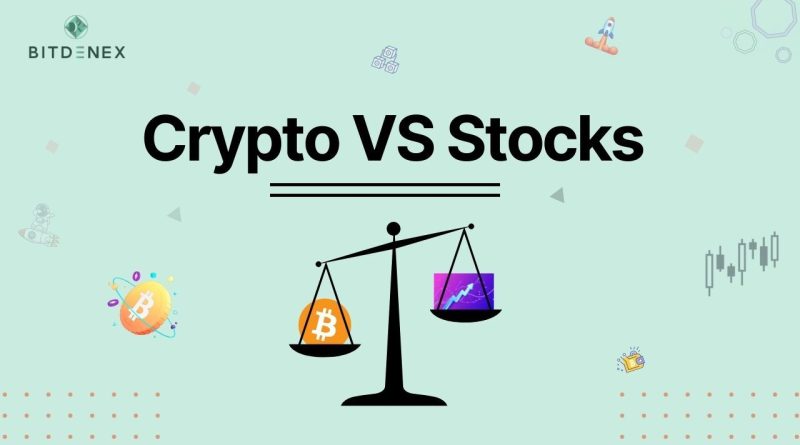Crypto vs Stocks: What Is The Difference?
Introduction
Stocks are a well-known asset class that can provide both long-term and short-term returns. A cryptocurrency asset is a relatively new financial instrument that is more volatile and risky than traditional financial instruments. Crypto is often seen as an alternative to more traditional assets, even though both instruments attract traders and investors. However, in both markets, there are profitable strategies.
What is cryptocurrency?
Cryptocurrencies are digital currencies powered by blockchain technology. Their transactions are typically secured and verified using cryptographic techniques. Cryptocurrencies run on decentralized networks, and their market value is determined by supply and demand.
What is a stock?
Business stocks represent partial ownership of equity and reflect the value of a functioning business. The owner of a stock is sometimes eligible for a dividend from the company’s profits. Stock values can change depending on the company’s performance and other factors such as relevant news announcements.
What are the main differences between cryptocurrencies and stocks?
Cryptocurrencies and stocks can both be used by investors to build wealth. However, investing in stocks is not the same as investing in cryptocurrency.
Unlike stocks, investing in cryptocurrency does not imply stock ownership in a company. Dividends are not paid to crypto investors in the traditional sense. Instead, for passive income, one can lend or stake their crypto tokens.
There are also significant differences in the trading of cryptocurrency and stocks. You can buy cryptocurrency at any time of day or night at any digital currency exchange, whereas stock exchanges have limited hours on weekdays.
Pros and cons of investing in cryptocurrency
Pros
Accessible: Crypto is borderless, and it can be accessed by anyone who has an internet connection.
Decentralized: Cryptocurrency systems are generally decentralized, making them resistant to censorship and centralized control.
Inflation-resistant: Because cryptocurrency prices are not directly influenced by central banks’ monetary policies, they are less susceptible to inflation. However, cryptocurrencies are not all the same, so the issuance rate and supply of each crypto asset must be considered.
Flexible: In comparison to stocks, there are more ways for investors to increase their crypto holdings other than trading. Crypto investors can profit from yield farming, staking, and liquidity provisioning. Bitdenex exchange is a great platform where you can increase your crypto holdings.
Varied: Many tokens have more than monetary value. Fan Tokens, for example, can provide token holders with exclusive benefits and privileges with their favorite sports teams or brands. Some cryptocurrencies are governance tokens, which allow holders to vote on the development of a specific project or protocol.
Cons
Price volatility: The cryptocurrency market is notorious for its wild price swings. The prospect of quick profits can be very appealing to new investors. They should be aware, however, that the potential for equally dramatic losses exists.
Imperfect regulation: The use of cryptocurrencies is legal in many countries, but they are not completely and universally regulated. The investor should be aware of potential compliance issues and conduct legal research in their region.
Custody risks: Cryptocurrencies like Bitcoin require private keys to access tokens in a digital crypto wallet. A lost seed phrase or a lost crypto wallet could result in you losing access to your crypto forever.
Returns not guaranteed: Cryptocurrencies are no different from other financial markets in that there are no guaranteed returns. There is no guarantee that Bitcoin and other altcoins will continue going up in the future, and there is a chance they may not perform well during a shorter investment period.
Pros and cons of investing in stocks
Pros
Increasingly accessible: With the proliferation of online platforms and mobile apps on the market, it is becoming easier to invest in stocks. Many of these services have user-friendly interfaces and are integrated with other financial services.
Regulated: The stock market is heavily regulated by many governments. In the United States, for example, publicly traded companies must disclose information to the Securities and Exchange Commission (SEC), a government oversight agency in charge of investor protection.
Variety: Retail investors can choose from a diverse range of stocks in various industries and sectors. Traders can select equity based on a variety of criteria, including the company’s business model and location, as well as whether or not it pays dividends.
Cons
Volatility: The stock market, too, is susceptible to short-term price fluctuations. When a company performs well, its stock price rises. Similarly, if a company reports losses or receives negative press, its stock price will most likely fall. In addition, certain stocks may be more volatile than others.
Higher fees: The fees associated with stock exchange transactions are generally higher, and there are more of them than with crypto trading. Other charges apply when you buy or sell stocks in addition to brokerage fees and commissions.
Returns not guaranteed: Stocks, like any other financial market, do not offer guaranteed returns. While stocks frequently outperform alternative investments over the long term, there is a chance that they will underperform during a shorter investment period.
Closing thoughts
There are many differences between crypto and stocks, but they also share many similarities. Both crypto and stocks are valid investment choices, and they can serve different purposes in your portfolio.
Use this link to sign up and start trading with 0.20% trading fees at Bitdenex Exchange.

